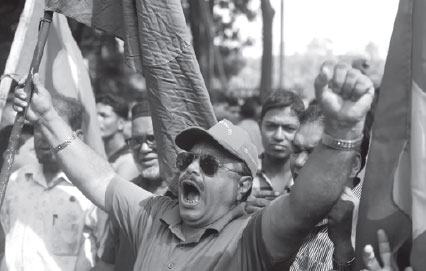Bangladesh court sentences tycoon to death
Islamist party leader convicted of war crimes during 1971 conflict with Pakistan
A wealthy media tycoon who is a key figure in Bangladesh's largest Islamist party was sentenced to death on Sunday for war crimes, just days after the party's leader was ordered to be hanged for similar offenses.
The war crimes court found Mir Quasem Ali, an official of the Jamaat-e-Islami party, guilty of 10 charges, including murder and abduction, during Bangladesh's 1971 war of independence against Pakistan.
Ali, 63, stood up and loudly protested as the chief judge announced the sentence in a packed court.
"It's a motivated judgment," he said, adding it was handed down on the government's orders.
Ali, who owns a television station and newspaper aligned with Jamaat, was convicted of running a militia torture cell that carried out killings, including that of a young independence fighter.
"The country and the people affected have finally got justice. Mir Quasem Ali has been sentenced to death for the murder of a teenage freedom fighter, Jashim," prosecutor Ziad Al Malum told reporters.
"The young boy was abducted and his body was thrown in the Karnaphuli river," he said.
On Wednesday, Jamaat's top leader, Motiur Rahman Nizami, was sentenced to death for heading a pro-Pakistan militia in 1971, a decision that sparked protests by supporters.
Jamaat called a nationwide strike following Nizami's verdict. The stoppage was still in force on Sunday, with many schools and businesses closed and traffic thin.
The party announced plans for a new strike on Thursday in protest of Ali's death sentence.
Similar judgments against other Jamaat officials last year plunged the country into one of its worst crises. Tens of thousands of Jamaat activists clashed with police in various protests that left about 500 people dead.
Ali, who also has shipping and real estate interests, became the eight Islamist sentenced to death by the controversial war crimes court, set up by Prime Minister Sheikh Hasina's secular government in 2010.
Ali, a former leader of Jamaat's powerful student wing, helped revive the party by setting up charities, businesses and trusts linked to it after it was allowed to operate in the late 1970s.
The tycoon, who was arrested in 2012 on 14 war crimes charges, heads Diganta Media Corp which owns a pro-Jamaat daily and a television station.
The government shut down the television station last year for inflaming religious tensions.
Defense lawyer Tanvir Ahmed Al-Amin called the charges against Ali "baseless and false" and said they would appeal the verdict in the Supreme Court.
"We've not got justice despite proving that he was not at the crime scenes during the war," the lawyer said.
Jamaat and the main opposition Bangladesh Nationalist Party have accused the government of using the war crimes court to target their leaders through phony charges.
Human rights groups have also criticized the trials, saying they fall short of international standards and lack any foreign oversight.
Hasina's government maintains the trials are needed to heal the wounds of the conflict, which it says left 3 million people dead.
Independent researchers estimate that between 300,000 and 500,000 people died in the 1971 war.
AFP - AP
|
Activists and former freedom fighters who fought in the 1971 war demonstrate after the sentencing of Jamaat-e-Islami party leader Mir Quasem Ali in Dhaka on Sunday. Munir Uz Zaman / Agence France-Presse |
(China Daily 11/03/2014 page11)









